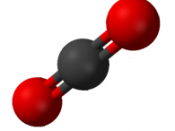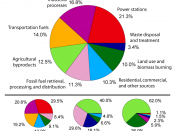Greenhouse gases naturally blanket the Earth and keep it about 33 degrees Celsius warmer than it would be without these gases in the atmosphere. This is called the "Greenhouse Effect". Over the past century, the Earth has increased in temperature by about .5 degrees Celsius and many scientists believe this is because of an increase in concentration of the main greenhouse gases: carbon dioxide, methane, nitrous oxide, and fluorocarbons. People are now calling this climate change over the past century the beginning of "Global Warming." Fears are that if people keep producing such gases at increasing rates, the results will be negative in nature, such as more severe floods and droughts, increasing prevalence of insects, sea levels rising, and Earth's precipitation may be redistributed. These changes to the environment will most likely cause negative effects on society, such as lower health and decreasing economic development. However, some scientists argue that the global warming we are experiencing now is a natural phenomenon, and is part of Earth's natural cycle.
Presently, nobody can prove if either theory is correct, but one thing is certain; the world has been emitting greenhouse gases at extremely high rates and has shown only small signs of reducing emissions until the last few years. After the 1997 Kyoto Protocol, the world has finally taken the first step in reducing emissions.
The "greenhouse effect" is the heating of the Earth due to the presence of greenhouse gases. It is named this way because of a similar effect produced by the glass panes of a greenhouse. Shorter-wavelength solar radiation from the sun passes through Earth's atmosphere, then is absorbed by the surface of the Earth, causing it to warm. Part of the absorbed energy is then reradiated back to the atmosphere as long wave infared radiation. Little of...


